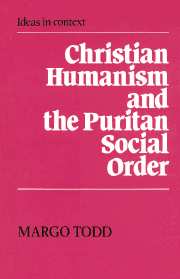Book contents
- Frontmatter
- Contents
- preface
- Abbreviations
- 1 Introduction: The demythologizing of puritanism
- 2 Christian humanism as social ideology
- 3 The transmission of Christian humanist ideas
- 4 The spiritualized household
- 5 Work, wealth and welfare
- 6 Conscience and the Great Chain of Being
- 7 The conservative reaction: Trent, Lambeth and the demise of the humanist consensus
- Bibliography
- Index
6 - Conscience and the Great Chain of Being
Published online by Cambridge University Press: 06 July 2010
- Frontmatter
- Contents
- preface
- Abbreviations
- 1 Introduction: The demythologizing of puritanism
- 2 Christian humanism as social ideology
- 3 The transmission of Christian humanist ideas
- 4 The spiritualized household
- 5 Work, wealth and welfare
- 6 Conscience and the Great Chain of Being
- 7 The conservative reaction: Trent, Lambeth and the demise of the humanist consensus
- Bibliography
- Index
Summary
Inferior authority cannot bind the superior: now the
courts of men and their authority are under
conscience. For God in the heart of every man hath
erected a tribunal seat, and in his stead he hath placed
neither saint nor angel, nor any other creature whatsoever,
but conscience itself, who therefore is the
highest judge that is or can be under God.
William Perkins, 1596Thou must not rest upon the testimony and suggestions
of thine own conscience … Why should you
think yourselves born, or grown so good divines, that
you need no counsel; in doubtful cases, from other
men? … For our Judge, which is the conscience, let
that be directed before hand, by their advice whom
God hath set over us.
John Donne, 1622The conflict between Anglicans and puritans over so basic a Reformation assumption as the authority of conscience represents more than a theological disagreement. When Donne cast conscience down from the lofty height where it had been enthroned in the previous century and substituted for it the authority of the hierarchy, he was articulating not so much an ecclesiological position as an approach to the problem of social order – one which seems to have had very little to do with his theology. It was in fact a Catholic approach, and Donne adopted it not because of any identification with the doctrine of his popish foes, but because it happened that Catholics had recognized before protestants the antiauthoritarian possibilities inherent in the exaltation of conscience. It was the similar concern of the Anglican and Catholic hierarchies with social order which prompted them to re-emphasize the primacy of constituted authorities.
- Type
- Chapter
- Information
- Christian Humanism and the Puritan Social Order , pp. 176 - 205Publisher: Cambridge University PressPrint publication year: 1988

